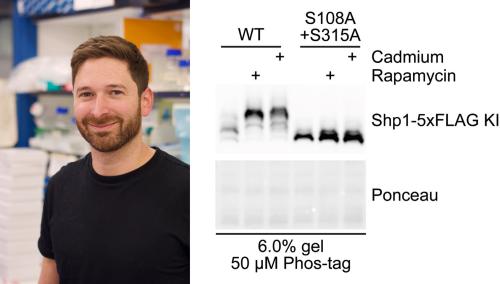
Researchers have uncovered multiple phosphorylation sites in the protein Shp1/p47 that are altered in response to cell stress. This finding could be important for understanding the regulation of cellular quality control pathways linked to diseases such as cancer and neurodegeneration. The new study, now published in the journal Life Science Alliance, was performed by Adrien Rousseau’s lab in the Medical Research Council Protein Phosphorylation & Ubiquitylation Unit (MRC PPU) at University of Dundee, UK.
The star of cellular quality control is the proteasome, a large barrel-shaped protein complex that degrades faulty, damaged and unwanted proteins. The proteasome is essential for cells to survive and thrive, therefore failure of pathways linked to proteasome function can cause disease. Another essential protein complex known as p97 dissociates proteins from complexes and cellular membranes, either for their recycling or for degradation by the proteasome, acting in concert with various cofactors such as Shp1/p47. Such quality control mechanisms are particularly important during cellular stress conditions such as heat, lack of nutrients, or exposure to environmental toxins.
In this study, researchers were interested to understand how p97 cofactors responded to cell stress. More specifically, they wanted to see if stress affected cofactor protein phosphorylation (the attachment of a phosphate group that commonly acts as a ‘molecular switch’). Budding yeast were used as model organism since they possess similar protein quality control mechanisms to human cells but are much easier to genetically manipulate. One cofactor, a Ubx-domain containing protein called Shp1/p47, was found to undergo drastic changes in phosphorylation during multiple cell stress conditions. Using CRISPR/Cas9-based genome editing, researchers were able to reveal the location of the stress-sensitive phosphorylation sites in Shp1. Finally, they discovered that a kinase (Mpk1) and phosphatase (PP1) seem to regulate the level of Shp1 phosphorylation in cells.
The study raises many intriguing questions such as: what is the functional consequence of Shp1 phosphorylation? Are other Ubx proteins regulated in a similar manner? Does stress-dependent phosphorylation of Ubx proteins occur in other species? It will be very interesting to see how these questions are addressed in the future.
The first author of the study, Alex Agrotis, contributed during his postdoctoral training in Adrien’s lab. Alex recently moved to a new position as a lecturer in the department of Cell & Developmental Biology (CDB) at University College London. He was greatly helped in achieving this through mentoring and teaching experience obtained via the Teaching, Research and Academic Mentoring Scheme at University of Dundee. He is also extremely grateful to Adrien and MRC PPU colleagues for their continued support.
Read the full paper here.

